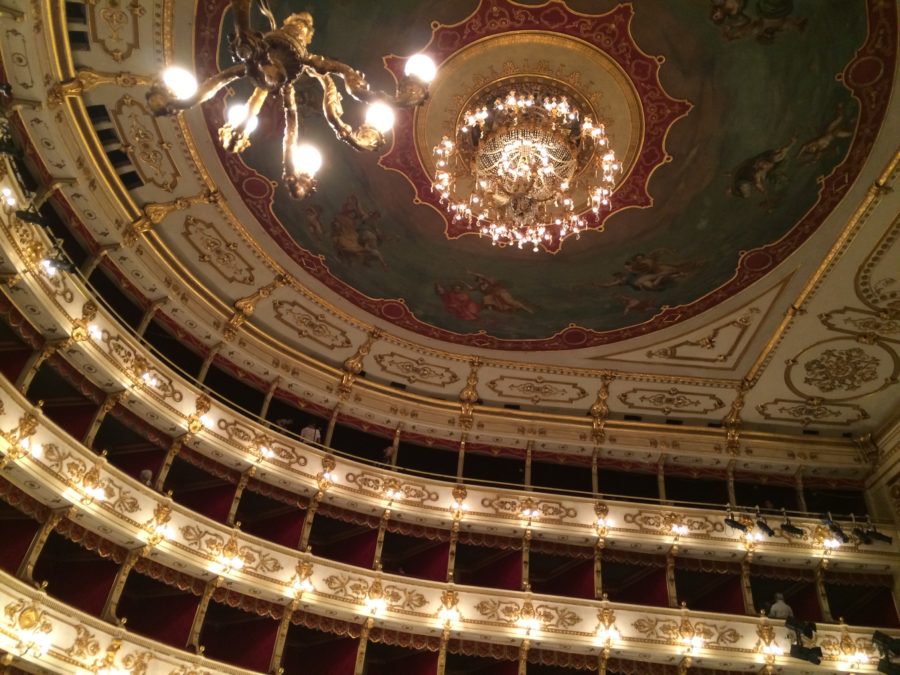
Photo: mine. Please do not use without written permission.
Prologue: The new section of this website, a non-classical cultural-writing category to which the following essay belongs, will be up in early 2024. In the meantime, enjoy!
Gennady Gladkov, whose works provided the soundtrack to a variety of movies, series, and animated works, died in Moscow last month at the age of 88. Among the many projects scored by the Russian composer was the 1978 film An Ordinary Miracle, directed by Mark Zakharov and based on the 1954 play by Evgeny Schwartz. A compelling allegory on the nature of creativity and its relationship to human connection, the Mosfilm movie is also a thoughtful meditation on the nature of human relating. At a time when division between people feels so sharp, its examination of connection, as much as power, offer powerful food for thought.
Gladkov’s unique melding of pop-Baroque-romantic sounds underscores the work’s meta-theatricalism, but in no way does that lessen its impact or dilute the sincerity 0f its core. The use of the Bear archetype, with its pungent Jungian and mythological ties, brought to mind obvious opera (Siegfried) and theatre (The Winter’s Tale) references but also examples from popular culture. “Wake Up Call“, an episode from the third season of American television series Northern Exposure (aired on CBS in 1992), written by John Falsey, Joshua Brand, and Diane Frolov. The episode depicts Alaska-based pilot Maggie O’Connell (Janine Turner) meeting a mysterious man in the woods (Andreas Wisniewski) near the start of spring. The man is gentle, handsome, handy; he catches fish with his bare hands. Is he Prince Charming come to life? Maggie accepts his invitation to visit his abode, a decorated cave, complete with candles and dinnerware. Spring begins to blossom; Maggie’s new flame vanishes, or rather, doesn’t, or rather… because he’s a bear, probably, though he could also be imagined; the writers quite intelligently don’t answer this conundrum. Rather than framing the premise in a patronizing manner (“Poor woman, she’s so desperate for a man she fantasizes about a wild animal…”) Maggie, and by extension the audience, is left to make individual conclusions. Such anthropomorphism isn’t necessarily cutesy or whimsical either; that categorizing crumbles against the very real framework of death (Maggie’s past romantic partners have all died tragically). The bear-man could be a coping mechanism, or he could indeed be real, or he could have a connection with First Nations mythologies (also suggested) – he could be everything, or something, or nothing. Again, viewers are trusted to decide: maybe it was real, maybe it wasn’t. Maybe imagination is every bit as powerful as reality.
This is the idea which largely powers An Ordinary Miracle. The act of imagining things and people into a real, lived plane of existence is symbolized by a young man, simply called the Bear (Aleksandr Abdulov) who, created and controlled by his writer-creator (Oleg Yankovsky), was turned into a human, and will revert to his original state upon kissing the one person he truly loves, the Princess (Yevgeniya Simonova). The narrative includes some very pointed critiques of power and the ways in which it is wielded (no small thing in Soviet culture) while simultaneously teasing out the ways in which power, love, responsibility, expectation, and free will intersect. Within its premise is the possibility of violence toward female partners and the beast’s eventual demise. Men as “wild beasts” is hardly a new idea, and as such the responsibility of “taming” is assumed to be the responsibility of female partners, again following cliched notions of gender and heteronormative romance. Such clichés are upended, as Maggie’s “Bear” is already pretty domesticated himself (he makes her dinner in his fancy cave) and the Bear in Zakharov’s film seems too gentle and wide-eyed to ever want to inflict harm on his beloved. (Corrupt politicians are a whole other story.) The Princess certainly acts the part of caretaker, even as she dons men’s clothes to disguise herself and engineer an escape, at one point wielding a sword and even deceiving her beloved.
Miracle brought to mind other cinema works with pseudo-anthropomorphic elements, including the 1987 film Moonstruck. Lorna Castorini (Cher) is asked by her fiance Johnny Cammareri (Vincent Gardenia) to facilitate a truce with his brother Ronny (Nicholas Cage), who cut his hand in an accident years before and has sworn off love as a result. Following their introduction in the sweaty basement of his bakery (trial by fire indeed) the one-handed “beast” sits with Loretta in his pin-tidy apartment and begrudgingly admits he enjoys the steak she made him before sharing details of his almost-marriage. “That woman didn’t leave you okay,” Lorna observes pointedly, “you can’t see what you are, and I see everything. You’re a wolf (… ) You’re scared to death of what the wolf will do if you make that mistake again.” Ronny angrily retorts that on the day of his intended marriage, Johnny “made me look the wrong way and I cut off my hand; he could make you look the wrong way and you could lose your whole head!” Later on, as the two walk home after a poignant night at the opera, he tells Loretta, “You call me a wolf, you run to the wolf in me – that don’t make you no lamb. You’re gonna marry my brother; why you wanna sell your life short?”
Writer John Patrick Shanley’s screenplay, The Bride and the Wolf, had floated around for years before director Norman Jewison took it on. The idea of men as essentially beasts is, as noted earlier, not new; the fairytale of Little Red Riding Hood has existed at least since the 17th century, although earlier versions exist in classical Greece and Rome, as well as East Asia, North Africa, and Scandinavia. Its various adaptations into music, TV, animation, games, a musical, and indeed pornography underline the story’s enduring appeal. There is something of the mythology at work in An Ordinary Miracle and Moonstruck, and Northern Exposure too– but something beyond it: gentle if insistent; hopeful if sad; fantastical if recognizably human. The works are less concerned with the rites of passage from childhood to adulthood and more concerned with the real challenges of relating – less about ‘taming’ than acknowledging the perceived importance of conformity within socio-cultural ties. The beasts here are not obvious, and they are not clichés, or even archetypes; they are human. Bear is delicate, thoughtful, scared; Ronny is a plain-spoken, music-loving neat-freak; Maggie is insecure and nursing a broken heart; Loretta is skittish and fearful, as much a creation of her Italian upbringing as The Bear is of The Wizard. Aware of with their own feelings and controlled by perceived limitations and heavy expectations within their respective words, they remain, for a time, locked in patterns of behaviour and reaction – until granted permission (of sorts) to exercise a self-determination that leads to a risky if richer path. Each film uses the form of the fairytale to disrupt expectations around that form, and that includes the respective happy endings, which would not have occurred without discord, loss, heated exchanges and grim silences. Robbing such tales of their uncomfortable moments robs them of their emotional weight.
In exercising imagination thusly we have to ask that the exercise includes such difficulties, because life often presents them unbidden. Horror, as it turns out, comes in many forms. The Wizard says to the Bear, “Men of wisdom rise to the sky and plunge into hell out of love for the truth; what have you done out of love for a woman?” to which the Bear responds (to Gladkov’s keen scoring), “I gave her up.” “Once in your lifetime there comes a day when the impossible is possible,” The Wizard says, admonishing no one but himself. “You missed your chance. I won’t help you anymore.” Pema Chödrön writes in The Places That Scare You: A Guide to Fearlessness in Difficult Times (Shambhala, 2002) that “(o)nly when we know our own darkness well can we be present with the darkness of others.” An Ordinary Miracle might have easily not had any miracle at all, ordinary or otherwise, without the counterpoint of tragedy – vulnerability, loss, risk, the possibility of change itself – ever-ready and perched at the door. There may or may not a rougher nature to bears, wolves, and brides, but it’s up to us as audiences (readers, viewers; humans) to decide on the danger they present, and to engage, to show up, and share that ” wild” side ourselves – to dare to fall in the snow, to be shot, to die, to live; to look at the moon, to climb in bed with the beast. Vulnerability is an inherent part of creativity. The Wizard stands alone amidst fire at the close of An Ordinary Miracle for a reason; he knows they are explosive partners.
Standing outside of Schwartz’s narrative, Gladkov’s music is a genuine “miracle” within Miracle. Touchingly sentimental one moment, cutting and dark the next, his style is a roadmap of character, emotion, memory, magic. A light in deepest darkness, Gladkov was an outstanding talent and will be missed. As the dark cold of winter cocoons much of the Northern Hemisphere, I recommend a pot of hot brandied tea, a viewing, and quiet moments away from the chatter of technology. Spring, when it does come, may look very different; until then, we can imagine.

